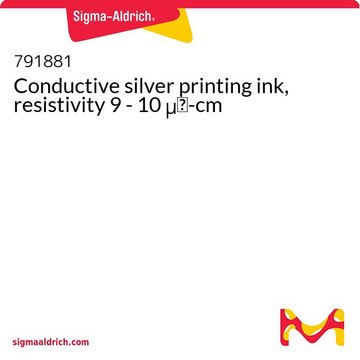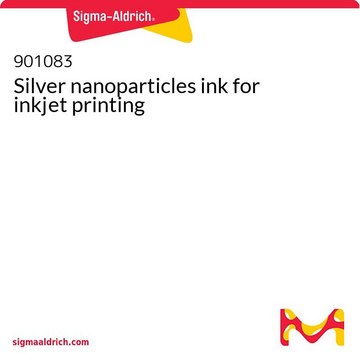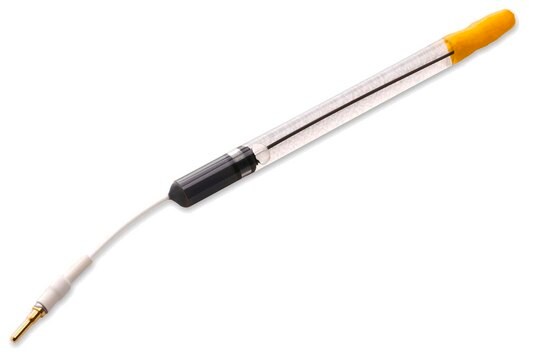901769
Flexible conductive silver paste for screen printing
Synonyme(s) :
Ag ink, C2080415P2, Conductive ink, Silver ink
About This Item
Produits recommandés
Description
Coverage: 250-270 cm2 per g (using a 230 mesh stainless steel screen)
Flash point: 90°C
Solid content: 44-46% (at 130°C)
Volume resistivity: 925 ohm cm at 60°C
527 ohm cm at 130°C
Forme
paste
Dureté
5B (pencil hardness)
Viscosité
0.72-1.78 Pa.s (Haake RS1 C20/2° TiL at 230 sec-1 at 25°C)
Description générale
The ink has undergone electrical and mechanical testing which has shown that it is very flexible.
Application
- Screen-printable silver paste material for semitransparent and flexible metal–semiconductor–metal photodetectors with liquid-phase procedure: This study presents a flexible MSM photodetector using conductive Ag paste electrodes made through a screen-printing liquid-phase process, offering insights into the semitransparency of Ag paste solutions (Tsai et al., 2022).
- Effect of polymer binder on the transparent conducting electrodes on stretchable film fabricated by screen printing of silver paste: This research examines the role of polymer binders in silver pastes used on flexible polyurethane and polyester films, focusing on rheological properties (Lim et al., 2017).
- Deposition of high conductivity low silver content materials by screen printing: Investigates novel polymer inks alongside traditional paste materials for their application in both rigid and flexible circuit printing, emphasizing cost-effectiveness and performance (Jewell et al., 2015).
- Printability of the screen-printed strain sensor with carbon black/silver paste for sensitive wearable electronics: Explores the use of carbon black/Ag nanocomposites in pastes for flexible printed electronic products, enhancing the sensitivity and flexibility of these devices (Qi et al., 2020).
- High-concentration copper nanoparticles synthesis process for screen-printing conductive paste on flexible substrate: While focusing on copper, this study provides relevant comparisons to silver pastes, detailing formulations suitable for screen-printing on flexible polyester substrates (Tam and Ng, 2015).
Caractéristiques et avantages
Low silver content paste presenting low resistivity, good flexibility and good adhesion on the mentioned substrates
Propriétés physiques
Sheet resistivity: 15-20mΩ/square at 25μm
30-45mΩ/square at 10μm
Bending test: ink survived 3 cycles
(Substrate is creased and bent internally and externally with a 2kg weight.
The test piece has failed when the resistance reaches 10 times the initial value.)
Double curing: aging factor of -0.7%after double curing at 150°C for 15min
How water test: aging factor of -0.2% after boiling for 1hour
Notes préparatoires
Please mix well the paste without introducing air bubbles prior to screen printing.
Screen Printing Equipment: semi-automatic, manual
Ink Screen Life: >3 hours
Screen Types: suitable for use with polyester or stainless steel meshes in the range of 156 to 325 tpi.
Typical Drying Conditions: Dry at 130°C - 150°C for 10-30 minutes or on a belt dryer with air flow that sees 130°C-170°C for 5-10 minutes.
Clean Up Solvent: ethoxy propanol or sericol
Substrate: polyimide, PET, PEN and can also be printed on more rigid substrates such as alumina
Informations légales
Mention d'avertissement
Warning
Mentions de danger
Conseils de prudence
Classification des risques
Aquatic Acute 1 - Aquatic Chronic 1
Code de la classe de stockage
10 - Combustible liquids
Classe de danger pour l'eau (WGK)
WGK 3
Point d'éclair (°F)
194.0 °F
Point d'éclair (°C)
90 °C
Faites votre choix parmi les versions les plus récentes :
Déjà en possession de ce produit ?
Retrouvez la documentation relative aux produits que vous avez récemment achetés dans la Bibliothèque de documents.
Les clients ont également consulté
Articles
Dr. Chan and researchers highlight flexible transistors are the building blocks of next-generation soft electronics. Among all the reported material systems that can be fabricated by researchers, such as circuits, biosensors, stretchable displays, and others,1–5 small molecular weight organic semiconductors are among the most promising candidates for flexible transistor applications. For these small molecular weight organic semiconductors, the semiconductor forming the conductive channel dominates the device performance.
Professor Tokito and Professor Takeda share their new materials, device architecture design principles, and performance optimization protocols for printed and solution-processed, low-cost, highly flexible, organic electronic devices.
Notre équipe de scientifiques dispose d'une expérience dans tous les secteurs de la recherche, notamment en sciences de la vie, science des matériaux, synthèse chimique, chromatographie, analyse et dans de nombreux autres domaines..
Contacter notre Service technique







![[6,6]-Phenyl C61 butyric acid methyl ester ≥99%](/deepweb/assets/sigmaaldrich/product/structures/359/221/d990c746-0960-4c69-bf76-fe09b193824d/640/d990c746-0960-4c69-bf76-fe09b193824d.png)



